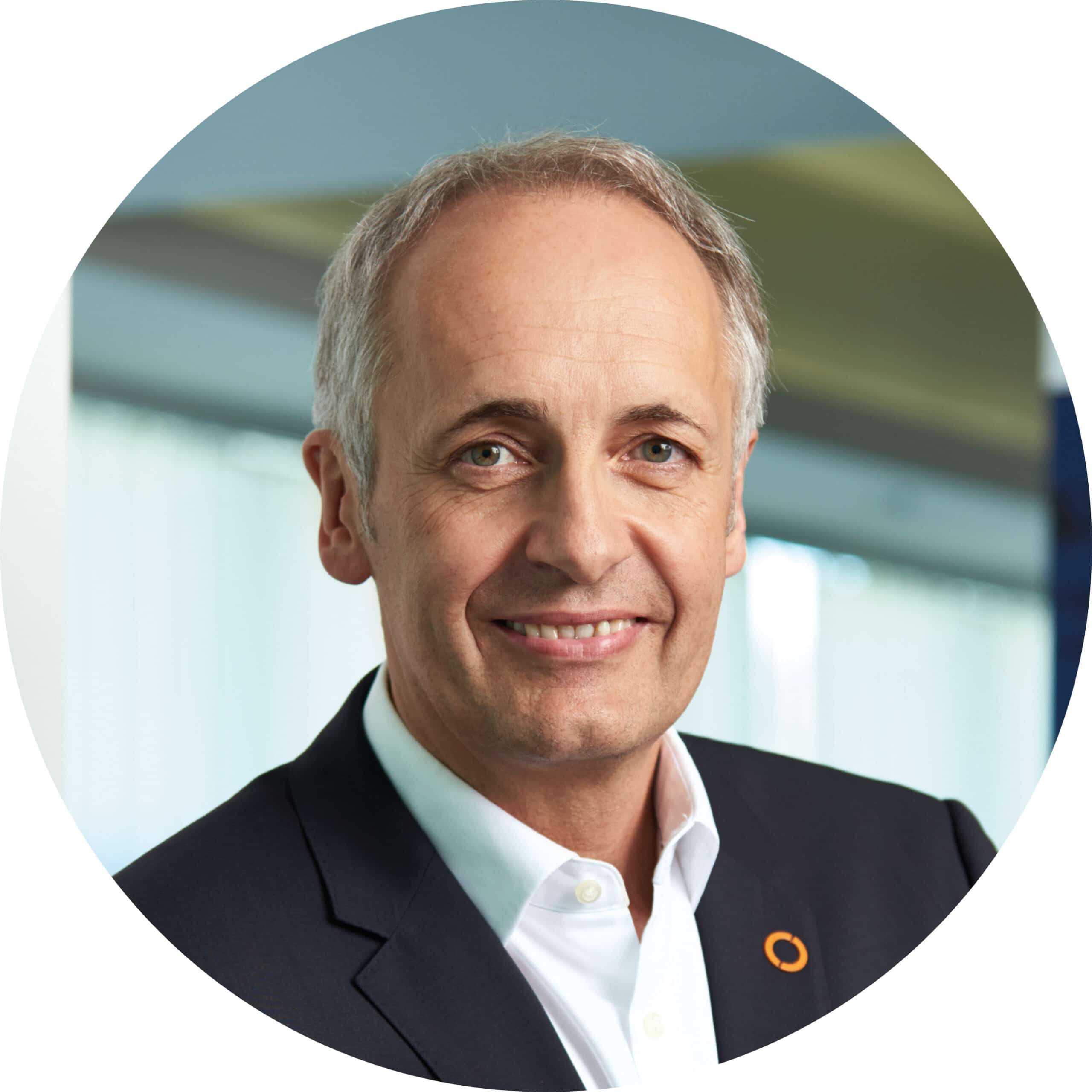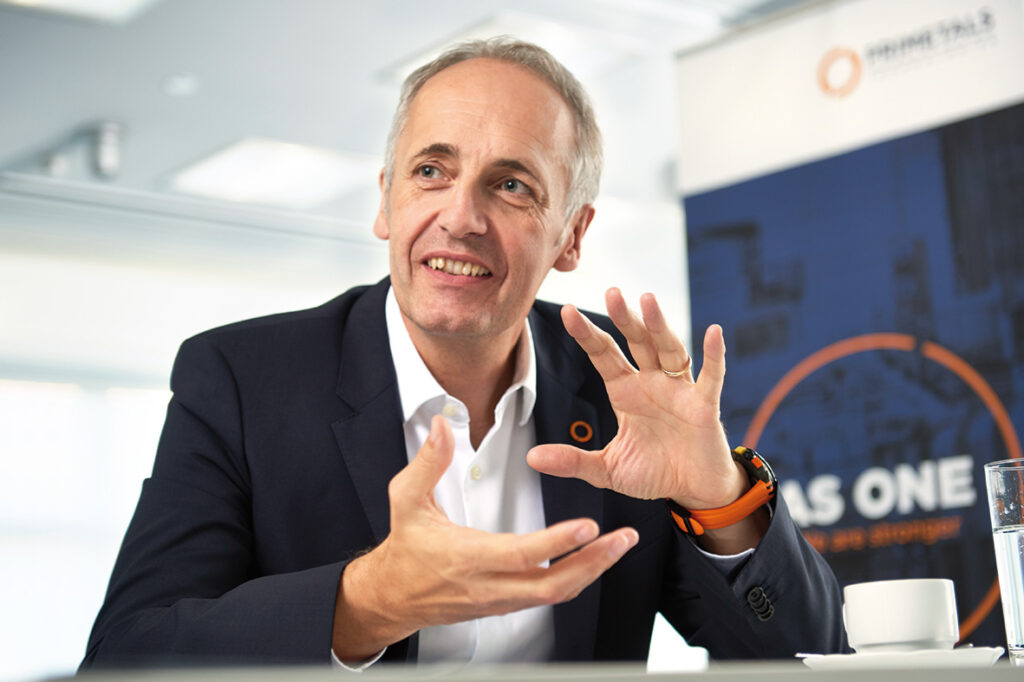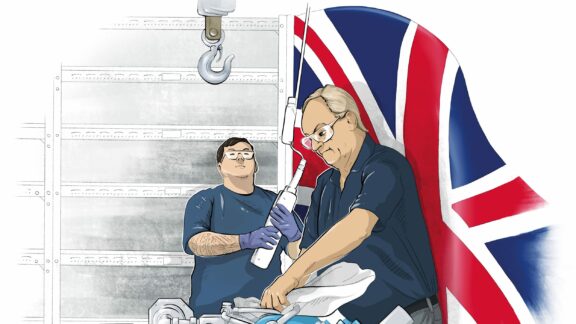This post is also available in: 简体中文 (Chinese (Simplified))
It is no longer enough just to have the right technology. Global overcapacity and merciless competition are forcing metals producers to continuously optimize operations and slash costs at every step of the value-added production chain. Karl Purkarthofer, who recently became head of the Metallurgical Services Business of Primetals Technologies, discusses the future of metallurgical services – not only how traditional plant services can be taken to the next level of quality, but also how breathtaking IT advances and the tremendous strides made in data analytics will radically transform service business models and open the door to new ways of partnering with customers. Above all, he sees service as the key to maximize value for metals producers.

Since becoming head of Metallurgical Services at Primetals Technologies, what is your primary objective and what do you see as the main challenge that needs to be addressed?
Karl Purkarthofer: As a lifecycle partner, we are a global company acting in local markets close to our customers. Being connected both physically and digitally makes us better at understanding the needs of our customers and more efficient in providing the right solutions. At the end of the day, the service business is predominantly a local business. How to provide as much value as possible for our customers from such a powerful global network of some 1,800 service specialists at more than 30 locations worldwide and ultimately to serve our customers even better is the main challenge. We need to provide value- added solutions and earn the trust of our customers day by day in order to be able to form partnerships. Personally, I strongly believe in the value of partnerships and global networks. Especially in today’s challenging industry environment, those who can build such partnerships and networks and are able to create value from our hyperconnected world will have a better chance to succeed in the long run.
What is your vision for improving the scope of services that Primetals Technologies can offer its customers in connection with digitalization and “Industry 4.0” technology?
Karl Purkarthofer: In the service business digitalization will act as an enabler in the short to medium term, yet in the long run, it will transform our whole business. It will affect all parts of our organization and activities in a positive way. There is enormous potential in connecting the digital and physical service worlds. All of the traditional services we offer today, like maintenance and repair, spare-part supply and management, training and consulting will be affected and can be taken to a next level of service quality through digitalization. Furthermore, the availability and analysis of data will open up new service business models and new ways of partnering with our customers. We are very active in this field and already offer a number of applications, such as for predictive maintenance, all based on advanced analytics and modeling. Here we can optimize maintenance planning and reduce the cost of unscheduled shutdowns. Every dollar we can save per ton of produced metal by better managing the customer’s assets will have a huge impact on their bottom line. Generally, the field of future IT-driven applications is infinite. It is important not to target the all-in-one solution, but to focus more on creating small applications that can be easily implemented and provide immediate benefits for our customers.
With our deep technology, process, automation and maintenance know-how, we have the perfect ingredients necessary to excel in those developments. Therefore, we are speeding up our transformation efforts to match the pace of IT and sensor technology. For this again, partnerships are very important, specifically because IT in the past has not been the focus of traditional plant or machine builders or technology providers. Therefore, we are thinking out of the box and embracing open innovation practices. For example, with our Business Factory program, we are linking our company with IT start-ups to benefit from the developments and the momentum in this field.
What portion of metallurgical services do you think might be conducted remotely, say in ten years’ time?
Karl Purkarthofer: We think that in time there will be a step-by- step shift from on-site-driven to remote-driven services. The speed of this shift will depend on the availability of technology and the related switching cost. In the future, robotic solutions and automated component-exchange systems will be remotely controlled to fulfill maintenance- related tasks. Artificial intelligence and machine learning will play a major role here. There are already self-learning robots that can sort waste materials and scrap. Can you imagine the impact that this will have on production flexibility? Also, remotely provided maintenance assistance systems that use augmented reality and mobile devices will further optimize routine activities and provide different types of recommendations. Additive-manufacturing technology will allow specific spare parts to be supplied on demand and just in time to the required site. All such activities will eventually be controlled from a centralized remote operation and maintenance center.
In which regions do you expect the service business to grow and in what ways?
Karl Purkarthofer: In talking with customers, we see that there is potential for the service business across all regions. Just as the maturity stage of the service markets is different in different parts of the world, the service approach must also be different. For example: North America has been a service-driven market for decades. In comparison, the emerging nations – especially in Asia – are just on the verge of entering into a service-driven society, which opens the door to a huge future potential for industrial services. A lot of high-end technology has been installed during the last decade, which now – together with a strong demand for productivity and the necessity to differentiate with high-quality products – also makes quality maintenance and know-how services essential. With our technology, process and maintenance know-how, we are supporting our customers to produce better quality and become more cost efficient at the same time.
Karl Purkarthofer is Senior Vice President and Head of Metallurgical Services at Primetals Technologies. He holds a master’s degree [Dipl.-Ing.] in mechanical engineering and economics from the University of Technology in Graz and an executive MBA from IE [Instituto de Empresa] in Madrid. After completing his university education, Purkarthofer joined Voest-Alpine Industrieanlagenbau (VAI, a predecessor company of Primetals Technologies) – in 1993. He served in managerial positions in different countries and company areas, including steelmaking, environmental technologies, rolling and processing, before heading the company’s strategy department and joint-venture integration.

In these days of hackers and malicious software, don’t you think that customers might be extremely cautious about allowing an external service provider to remotely access sophisticated plant and process software systems?
Karl Purkarthofer: Data security is a big topic in the world of digitalization. A lot of progress has been made in the meantime to guarantee data protection. Here, the consumer industry is paving the way for the industrial world. In the Facebook society, data protection is imperative and it drives technological progress and regulatory necessities. The industry sector is learning from these developments. However, it should also be mentioned that in the service field we are not always talking about highly sensitive production, quality or process data. And, at the end of the day, it’s always the customer who decides what data and in which way to make it accessible. Partnership and trust also play a major role here.
What has been the experience of Primetals Technologies in the past in connection with performance-based service models with no upfront cost? Do you think that this type of service business model will expand in the future?
Karl Purkarthofer: Our experience with such models has been excellent. We have been providing performance-based service models quite successfully to certain customers for over 20 years. More than ever, the steel industry is driven by cost competitiveness, so everything that can be shifted to opex-driven models is a favorable way for customers to do business. So we expect these and other new types of service models – especially those driven by digitalization – to increase in the future.
Most producers have been in the market for decades and they know their plant and its idiosyncrasies better than anyone else. Why do you think a service provider can offer better solutions than the producers themselves?
Karl Purkarthofer: Because as an integrated technology and service provider with deep process know-how, we will always be at the forefront of innovation – and so will our customers when they have a service partnership with us. Besides this, over the years we have developed service- related technologies, practices and know-how to help our customers to improve the lifetime and performance of their plants. Furthermore, we are tapping into the expertise of our 1,800 service specialists and sharing best practices across our service centers, which all members in our global network can ultimately benefit from. So we are talking here again about globally networked and optimized services. Based on all of this, we are creating win-win situations with our customers and – most importantly – long-lasting personal relationships, which, despite all future achievements through digitalization, will remain as the ultimate gauge of a successful service organization.

